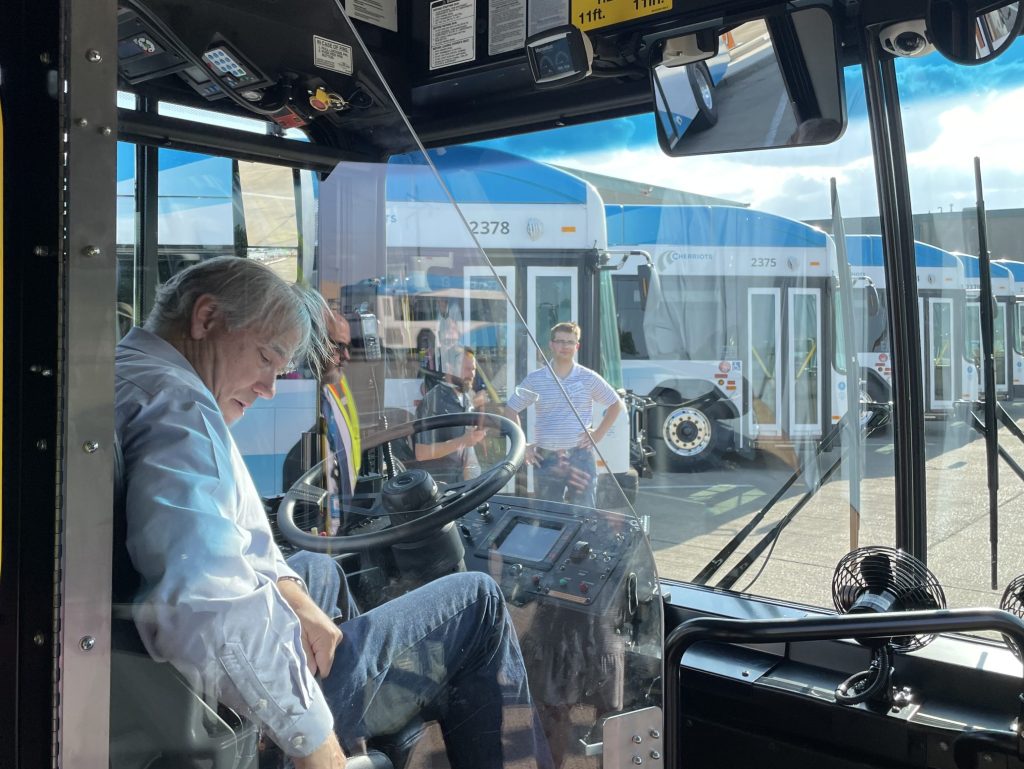Cherriots launches electric buses to drive route along NE Lancaster

Four battery electric buses will start driving up and down Northeast Lancaster Drive in mid-September. By Thanksgiving this year, the fleet of 10 electric buses will be driving the “electric corridor,” a term for the entirely electric route.
On Wednesday, Aug. 15, the Salem Area Mass Transit District, or Cherriots, hosted community members and government officials for ribbon-cutting the district’s first electric bus fleet.
The electric buses will drive route 11, which begins at the Keizer Transit Center and ends at the Marion County Jail. The lengthy 12-mile route will be Cherriots’ first zero-emission route in its district.
Cherriots Board President Maria Hinojos Pressey said route 11 was a chance to invest in historically marginalized communities, as the route travels from northeast to southeast Salem.
The neighborhoods along the route are lower income and have a higher share of Latino residents. Cherriots General Manager Allan Pollock previously said the demographics along the route ensure a broad range of Salemites will benefit from the buses’ reduced noise and air pollution.
The route’s high volume of riders also made it a good candidate for the new buses, Hinojos Pressey said.
“We’re driving towards a greener, sustainable future for our children and families,” she said to the crowd.
In January this year, Salem Reporter reported that Cherriots received federal money through the “Low-No” emissions grant in 2020, 2021 and 2023. The grants amounted to $22.7 million and, in addition to the district’s investments, funded the purchase of buses and charging stations.
In a grant application, the agency said one electric bus would decrease Cherriots’ annual energy use by 5,234 gigajoules, equal to 87 years’ worth of gas for an average American car.
To purchase and power the buses, Cherriots partnered with Gillig, ChargePoint, Salem Electric and PGE.
Cherriots Chief Operations Officer Tom Dietz said building one electric bus takes $1.3 million, and in December 2025 another 10 buses will be built. For now, operation and maintenance costs are unknown, but Dietz said they’ll know that information in about a year, after the electric buses have run for a while.
Originally, people at Cherriots thought the electric buses would require daily charging, but during a trial run of route 11, one electric bus used only 13% of its charge, Dietz said. The bus batteries have a half-life of six years and when they start to age, will be used to power other parts of the facilities.
Among the officials present Wednesday was U.S. Sen. Jeff Merkley, who helped secure funding to create the small electric fleet. Merkley said U.S. Sen. Ron Wyden and Rep. Andrea Salinas also advocated for the money.
“This is part of a vision of rebuilding, transforming,” Merkley said. “Mother Nature is not giving us little hints about the need to act, she’s hitting us over the head with a hammer.”
After speaking at the event and joining the ribbon cutting, Merkley joined guests for a ride on one of the electric buses to Cherriots’ Del Webb industrial location. There, Merkley took the electric bus for a spin around the lot.

Contact reporter Madeleine Moore: [email protected].
A MOMENT MORE, PLEASE– If you found this story useful, consider subscribing to Salem Reporter if you don’t already. Work such as this, done by local professionals, depends on community support from subscribers. Please take a moment and sign up now – easy and secure: SUBSCRIBE.

Madeleine Moore came to Salem after graduating from the University of Oregon in June 2024 with a bachelor’s degree in journalism. She covers addiction and recovery, transportation and infrastructure.



